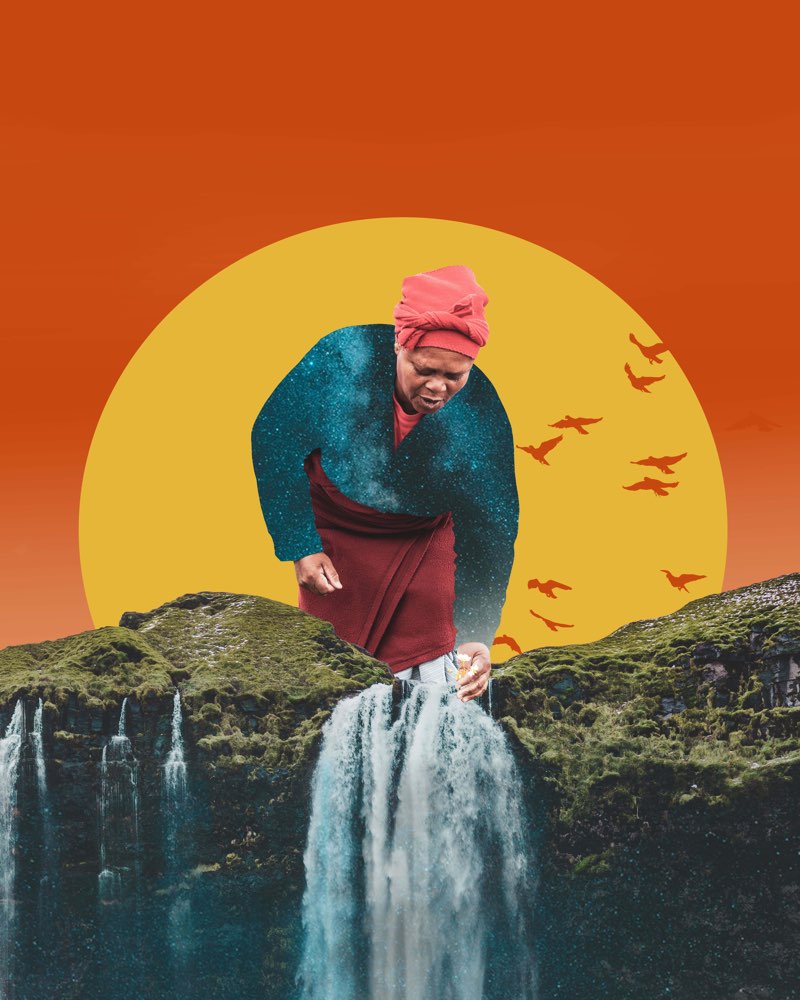
Nontobeko Javu
Age at interview: 63
Keiskammahoek, South Africa
Nontobeko — or “Ma Jey,” as others in the neighbourhood call her — welcomed us into her home with laughter and smiles. She lives alone in a small, green house at the base of an incline. Her companion is a pig that sleeps next to her front door. As you enter her gate, there is a fenced-off garden on the left and the house on the right. Above the gate lies a stretch of barbed wire, so you have to bend over to enter safely. Unaware of this burglar trap, we walked through the gate upright, and I cut my forehead slightly. Nontobeko apologised profusely. We later noticed she had a similar wire at the entrance to her garden and that many homes in the rural Eastern Cape region had the same. Nontobeko is 63 years old and was born and raised in kuQoboqobo (Keiskammahoek) in a village called Ndlovini, which is on a hilltop.[1] Nontobeko’s front door faces her plush, green garden. Next to the garden entrance sits a small wooden toolshed with recycled two-litre soda bottles filled with water. As she talks, she is clear and confident and states her wish for her story to be shared widely. But most importantly for Nontobeko, she wishes the youth in her community would read her story.
The joy of staying in the place where you were born and raised is that everybody knows you and you know everybody. My parents grandparents and great-grandparents were all from this region.
I grew up in a very strict Christian family with parents who didn’t allow you to do whatever you’d like. If the sun went down and you were not in the yard, there would be serious trouble. We were not even allowed to go play outside in our yard. We were all required to go to church, and drinking alcohol was strictly forbidden in the family.
My parents were very good, very strict, religious people who saw life as black and white. To them, there was just good and bad, with no middle ground or grey area. The way I grew up was enriching in a way that I only realised when I went to Cape Town as an adult to work as a domestic worker. I found it easy to respect other people, including my employers. I had no trouble learning new things or listening to others, because I was raised to be that way. I did what I was told and did not anger easily. That is just how I was raised.
When I was growing up, traditional values were extremely important. You respected other people, particularly your elders, and you respected yourself. We used to learn to do all the work around the homestead, including looking after the cows. There was no work for boys and work for girls. There was no "your mother, my mother." Every mother was your mother. Every father was your father.
There is a strong sense of community. We are like one family and we support each other. You cannot starve when members of your family have food. Sharing has always been a big part of the way we live with others in the community.
The real value of land
We grew up ploughing the fields. We grew our staple foods because there was no money to buy food. Our fathers and grandfathers didn't go to work in the towns or mines because they saw the value of land, working for yourself, staying close to your family and building a strong family unit. So I grew up in a family that prioritised growing food like pumpkins, corn, beans, cabbages, and spinach. My father had a garden for the vegetables in our homestead and big fields on the other side of our village for corn and pumpkins.
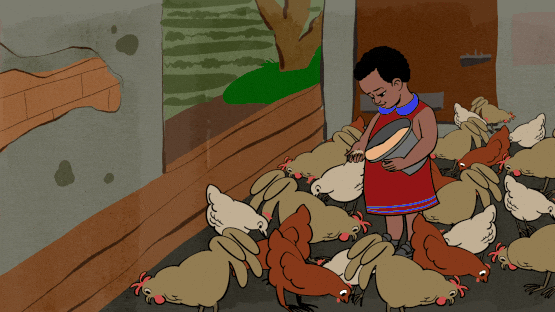
I remember vividly that as children we would go to school and come back and go and plough the fields. The mornings were quite similar, except that before school we would do work in the garden and not in the big field. I would do a lot of work inside the house and also look after the cows and chickens. As a young girl child, I remember polishing the floors with cow dung and plastering the walls of the houses with mud.[2]
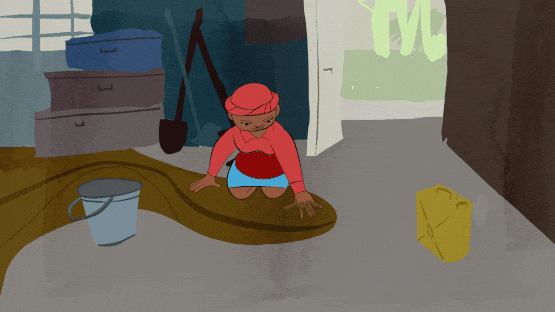
I think I was nine when I started to realise and understand the real value of land. My father made sure that we got that understanding, and ensured that everybody who was over 10 would work in the garden and in the fields.
The fields are larger pieces of land where we grew the grains that sustained us between harvests. A family could manage their garden on their own, but the larger fields required more hands. This meant that community members would help each other by going to each other’s farms in a rotation to work the land.
An extremely abusive marriage
When I was 16, I unfortunately had to stop going to school and get married. At that time, fathers were mostly concerned with getting cows for lobola, which made them marry their daughters off.[3] I was young and did not have a choice.
That marriage was not right for many reasons. I was very young and it was a marriage full of abuse and cruelty. My husband’s family was not Christian, which was a huge culture shock for me, and he was also a heavy drinker. The beatings took place in front of his parents and they never intervened. Even my children witnessed a lot of the abuse.
The strength to leave
The marriage ended when I was 20. That marriage was not just bad for me; it was also traumatic for my children. Seeing that is what eventually gave me the strength to leave.
During my marriage, I had four children: two girls and two boys. Nomfundo, my firstborn, was born in 1971. I think she suffered the most, emotionally and mentally from watching me in an abusive relationship with her father. It has affected her badly in her life and it broke her heart.
My husband did not only used to beat me but used to beat the children as well. My eldest has got a scar from one of the beatings. He beat her with a stick that has an iron bit at the end. She is still very bitter about that life experience. It hurts me because she is not good to her children either. Nomfundo is quite a stubborn character; even as a child, it was difficult to control her. I was relieved when she got married because it meant she was out of my hands. She lives with her children and does not communicate with me much. We only talk if I call her. She does not seem to need the love of people.
After Nomfundo came Mxolisi. Right from being a toddler, he was a sweet and respectful boy. As an adult, when he began to drink alcohol, you would never guess it, because he disguised it so well. He tried to hide anything that he thought would upset me. Though he was unmarried, he had lots of children with different women.
This boy was followed by my second daughter, Busisiwe. She is wonderful and also a very sweet girl. She knows the relationship between me and her sister is bad, so she will create opportunities for us to meet. She keeps trying to bring us together.
The last boy, Xolisa, also has a personality like Busisiwe, a respectful, humble and loving character.
After I left the marriage, I returned to my parents’ home with my children before leaving for Cape Town in search of work.
The move was illegal
When I first went to Cape Town, I was probably between 22-23 years of age, so still quite young. The move was illegal, which is why I couldn't take my children with me at that point. The apartheid police were always looking for us and waiting for us at the bus stations, so we would have to hide.
During one holiday, three years after I moved to Cape Town and while I was working for two lovely men that were from Zimbabwe [back then it was called Rhodesia], I was able to bring my children to visit at my employers’ suggestion. The elder of my two sons, Mxolisi, and two of my sister’s sons came and spent the holiday with me. We had to be careful not to get caught. At least I was only hiding them from the police and not my employers, because other people who risked it and brought children had to hide them even from their employers!
For about six to seven years, I lived away from my children. It was extremely difficult, but they eventually came to live with me in Cape Town. My parents were very good people to my children, but they couldn’t care for my children as I would have liked while my children were living with them in the Eastern Cape. I could not control what my children were eating or wearing, or care for them when they were sick.
My parents were old people. At the time they were helping me with my children, they were even older than I am now. When I would come to visit the village during holidays, I would find my children with no shoes, wearing dirty clothes, and with cracked heels. I would send things like shoes for my children, but my parents believed that wearing shoes when you were in your village was a waste. So they’d pack them away for a special occasion, often till the shoes were too small for my children to wear. I don't want to say that my parents failed me, but it was a tough time.
Back home for good
After leaving my marriage and my village, I lived in Cape Town for 37 years. I would come to the village during the holidays to visit, but I finally moved back home for good in 2010. I had fallen ill near the end of my time in Cape Town and was only able to walk with the help of a walking stick. While I was in Cape Town, my mind was always on the gardens and fields back here at home. As I was sitting there struggling, working hard as a domestic worker, cooking and cleaning for my employer, my mind was preoccupied with coming home to plough the fields.
Life in Cape Town was not easy. I would wake up early in the morning to go to the station to catch the train or taxis[4] to go to work. By the time you get to work, you are already tired, but you must start cooking, cleaning, washing, and taking care of the kids. You are on your feet the whole day, and in the afternoon, you are back at the station, waiting to go home so that you can wake up the next day and do it all over again.
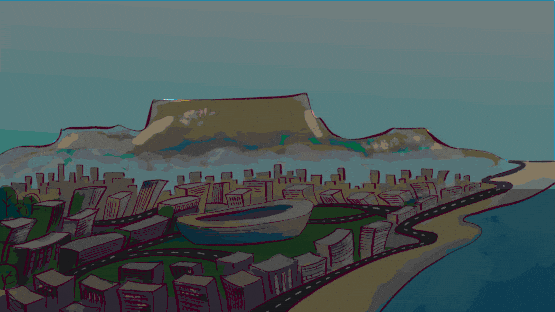
When I decided to move back home, I remember telling my employer. Their first response was, "What are you going to eat there?" I told them I would grow my own food. When they continued to resist my idea, I told them, "I'm not going to work for riches. I will do something that will allow me to have enough of the kinds of food I want to eat.”
Unlike my employer, I was not dreaming about pursuing riches. I just wanted to grow enough to feed myself and my children well. I left my employer without saying goodbye properly because they kept telling me that moving back home would never work. I left and came home without money.
In retrospect, I can see why I had leg problems. Here at home, I am no longer working according to someone else’s instructions. And once I was back home, the problem with my legs disappeared without any treatment.
He thought nothing could ever grow here
When I came back from Cape Town and started this garden of mine, it was just virgin land with many stones and grass. I have another garden at what was my parents’ home, and I also grow food like pumpkins, maize, and other vegetables there.
In the olden days, if you wanted land, you went to the chief and he would allocate some land for you. This land where I am living now belonged to someone else. He did not want it because it had many stones and is not very large. Since it was close to my father’s land, he went to the chief and asked if it could be given to me instead.
[The land] was so full of grass that I had to ask my brother to help till the land for me with his tractor. All the tractor managed to do was cut the earth into thick wedges of earth with grass still attached to it. I just dug holes and planted some seeds in these thick wedges of earth, using seed that I had bought from King William’s Town.[5]
I didn't have money when I came from Cape Town, so I just put up a little barbed wire, because I didn't have fencing. I tried to put some scrap metal on the sides of the garden, down into the ground, so that the animals wouldn't come through there.
I remember the neighbours asking me why I was doing this, because it was very hard work. It was true that it was hard for me, but you know, I just wanted this garden with my whole heart. When I think of those days that I was ploughing on land that had not been properly prepared and furrowed, I can’t understand how I managed to do it.
That is how I acquired this land. I have the documents to prove it. I think if the man who gave me this land was to see it now, he would be shocked and faint , because he thought nothing could ever grow here.
Even I don’t know how I managed to grow food on this land. It baffles many people. I did the work without asking for help from anyone. I prefer to do things myself — that way, they get done the way I want them. Farming is in my heart and I love it, you know!
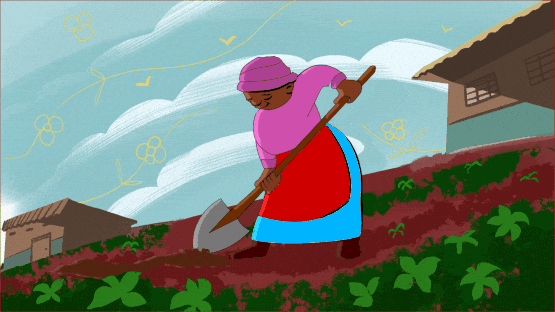
I have learnt how to treat this land
I wake up and I am in the garden from dawn to dusk. After my garden was in full swing, I started selling butternuts within the community in 2011. I had a lot of butternuts, pumpkins, huge beetroot, cabbages, and spinach. I sold those things and it filled my heart.
I didn't use any fertilisers, nothing. I don’t need chemical inputs to maintain my garden. During the winter I add cow manure to the soil, turn it over, and leave it beneath the soil till it is planting time. That is the only manure that I use. I didn't use anything artificial that would make the garden grow faster, and I never used the tractor again after that first time either. All these years I've just been using the hoe, and it gives me a lot of food.
Outside of what I’ve learnt from my parents and other elders in my community, my knowledge on agroecology has also come from Ntinga Ntaba kaNdoda.[6] Through different workshops with Ntinga Ntaba kaNdoda, I have been learning how to grow food without fertilisers and how to harvest water. No one had taught me how to harvest water before. I remember that in my father's garden, he used to have us go fetch water from the river for the garden.
What I love most about my garden is that I never buy vegetables. I eat from my garden. The one thing I don’t have that I would like to have are peach trees.
A scary thing for the future
We have challenges with water in this area, so we rely on rainwater. When it's raining I collect all the water that I can into bottles and cans. I used to water my garden early in the morning, but I realised that early in the morning was not good — because when the sun comes up, it dries the soil, because the water evaporates quickly. Now I water the garden at night, and this gives the water time to seep down. The land here is full of stones, so it dries up quick. [T]hat can be a challenge, but it doesn’t bother me much because I have learnt how to treat this land.
The youngsters now, they don’t care about the land. “The land is gold,” as I often say. They don’t care for this gold. They don’t even care whether it rains or not. Our region has many slopes, and the rainwater easily sweeps the soil away. So you need to prevent this. It is mainly the older people who are interested in preventing this kind of erosion and keeping all those nutrients in the ground. Land means life to me. I cannot imagine life without land. What can we do in this world without the land?
The real challenge is the mole. Whenever you grow food that grows underneath the earth in this region, you will have to deal with moles eating your produce.
There is a lot of talk that the weather is changing due to climate change. It makes me wonder what will happen in the years to come. How will people grow food with no rain? Already, there are problems because there is no water. Even in the taps that government has installed, they go dry. How are we going to grow food in our gardens and fields if this continues? When I was still working in Cape Town, I remember hearing talk about climate change. [I]t was just a story to me at the time, but I see the changes now. It is a scary thing for the future.
What the government didn’t think about
This is my life — my garden and the fields where I plough mealies with the cooperative I belong to. When we harvest from the maize fields and sell the produce, we make money.
The maize is part of a collective project, and for that, we use chemical fertilisers. It’s not organic like my garden. The collective maize project was a government-driven thing. They came in 2014 and explained that we could work on this kind of project. The government provided the fertilisers and we did not question it.
Given the size of the fields, it would have been nearly impossible to use organic fertiliser on that whole field, because we do not have trucks for moving manure or compost to the field. The field is very big and the members are not young people. As a result, the project runs the way the government brought it to us.
What the government didn’t think about, though, is supporting the creation of a market where we could sell our produce. We are still struggling with this issue and with the fact that we don’t have adequate storage for the maize after harvest.
In my community there are a few men that are committed to the land and grow food, but most of us are women. The men in this community seem to avoid spaces where there are women. The maize project, however, has men, but I think this is because of the scale of the project and potential for money. Sometimes the men call for meetings and do not tell me about it. They don’t like that I am a woman who is both outspoken and has exposure beyond this village. They are intimidated by me because I lived in the city for many years.
A sore subject
My eldest son died in 2010, shortly before I decided to come back home from Cape Town. When he died he was not married, but he had many girlfriends and many children with them.
The death of my son is a sore subject. He got sick and a girlfriend of his came and told me that they were both sick and were HIV positive. My son never mentioned it. I only heard this story from his girlfriend, and I couldn't allow myself to believe her. I thought that maybe she was just a jealous ex-girlfriend saying this out of jealousy and a broken heart.
One day, when I came from work, I found him in my place. He told me he had a stomach-ache, so I asked, “Did you go to the clinic?” He said yes and that he’d been given medicine but wanted to stay at home with me that night. But before we went to bed, his girlfriend came to pick him up and they left together. The following day he came late at night with a friend and the same girlfriend. He was very sick, and when I asked them to leave him with me, they agreed.
That night he fell out of the bed. He was vomiting. He was screaming for us not to switch off the light. My younger son, who was there too, and I were awake all night.
The next day, when we were taking him to the doctor, he kept trying to jump out the window because he felt hot, but then when we’d open the windows, he said he was too cold. When we arrived at the doctor, I took a wheelchair and put my son in and started wheeling him straight to the consulting room. The nurse tried to stop me, and I told her, "My child is dying. I need to see a doctor urgently." So I went straight to the consulting room, and the doctor attended to him immediately. They told us that they had to admit him, and they had to tie him to the bed in order to restrain him.
When we arrived the next day, he was on oxygen, with tubes in his nose, and he was no longer speaking. For days he was plugged up to the machines and not saying a word. I could see there was no life left in my son, and they asked me if I wanted them to just switch off the machines. My other children and relatives did not agree to this because they did not understand that he was already gone and it was only the machines that were breathing for him.
For a whole week I watched him suffer. He died on the following Sunday, exactly a week after he was admitted. The nurse said he had gone in there and greeted him and that my son opened his eyes, had a seizure and then died. I was relieved that he was no longer suffering.
For a while it was as though nothing had happened. I was fine, but as the days went by, I think I was going crazy. I wouldn’t know where I was or who I was. When I went to see the doctor after the funeral, I was diagnosed with diabetes, and I have had it ever since that time.
I don’t feel that loneliness
One of the things that sustains me is the community centre for the elderly that I am a part of. Living alone can be difficult, but I don’t feel that loneliness because of the community group.
When we get together we share our problems and give each other advice. Most problems are related to children, parents worrying about the lives or lifestyles of their adult children.
Church leaders and social workers come to visit us at the centre and ensure that we have eaten and that we are well. It is a day centre. We go and spend our days there, eat all our meals there, [and] then come home. When I am not in my garden, I am often at the centre. The government provides a grant that we use to buy food that is cooked at the centre, but most of the food we eat we bring from our gardens and fields as well.
Fresh food is the best food
Food is something that is really necessary. From schools, hospitals, hotels, everywhere, you can’t do anything without food. Healthy, organic food is the best way to preserve good health.
There is food that grows naturally from the land without even being planted; that is the beauty of nature! I just watch such beauty in amazement. I remember, as a child, there were many wild berries and fruits that the land provided. This food kept us healthy. We would spend the day out in the forests with the grazing animals, and we never starved because of these fruits. But these are no longer available because of climate change.
People are very sick nowadays because they are drinking fizzy drinks and they’re eating junk and processed foods. Fresh food is the best food, but people are eating food that has been canned or refrigerated for long periods of time. It’s not healthy. The youth think food comes from the shelves in stores. I wish for the children of the future to have lives that are as healthy and rich as the lives we had growing up.
Perhaps there is a way to get more people eating homegrown organic food if we are able to spread information about the damages that chemically grown foods cause. Even though organic food needs a lot of labour, at the end of the day, it is worth it because you’re getting good results.
I believe that to grow your own food, your own vegetables, is very important for your health, for your country, for your children. Maybe the youngsters who are around us and who are seeing what we’re doing can be inspired. It’s cheap, because there’s no money required. It’s especially important because it can also make you money. You can sell the vegetables. You can eat. You can feed the country with food.
I feel truly at peace
I work as much as I want in the fields and in my garden. If I don't want to go, I don't. When I wake up in the morning, the first place I look is in the garden, which is filled with birds. They enjoy my garden when I am not there, and when I come, they leave to make space for me in my garden. It is my favourite place to be. Even though all of my days are quite similar — except for Sundays, because I go to church — I feel truly at peace here. I don’t think I could live in a place without land again, like I had to do when I was in Cape Town. It was not healthy for me.
I feel very closely connected to the soil and the land. It is my heart. I need to live in a place with space and fresh air from the plants and the trees. I need to see rivers flowing. In Cape Town, life felt dull and gloomy, but as soon as I would get here and see all the palm trees, my whole being would light up. I would be engulfed by a kind of excitement I cannot explain. This way of life is my happy place.
When I am no longer here on this earth, I would like to be remembered by my children as a good mother and a good grandmother who tried to make up for the suffering that her children had to endure. I don’t want my children to suffer any more than they already have.
I just want to teach people to have respect for other people, which is a number one priority for me. I hope they will not spend their lives selling their labour to the mines or elsewhere and living on dead food bought from supermarkets. I want them to look after themselves and to be able to sustain themselves. I am growing good, healthy food here, and I would like them to do the same for themselves and their children.
- Keiskammahoek is a town in the Eastern Cape Province, South Africa. Ndlovini is a rural location that sits on a hilltop within this area.
- The smearing of cow dung and soil mixed with water, known as ukusinda, is an age-old practice in the rural areas to preserve floors in mud houses.
- Lobola is an African practice wherein payment, either in cash or heads of cattle, is provided from the prospective groom's family to the parents of the prospective bride for customary marriage. In some African cultures, the process of marriage begins with lobola.
- In South Africa, taxi refers to privately owned mini-buses that serve as public transport.
- King William's Town is a town in the Eastern Cape Province of South Africa, along the banks of the Buffalo River.
- Ntinga Ntaba kaNdoda is a rural community movement that mobilises for rights, democracy, land reform, and sustainable rural development. It is located in Keiskammahoek, Eastern Cape, South Africa. Community members formed Ntinga Ntaba kaNdoda in 2002 as an organisation to help propel the work and vision of the community forward.
